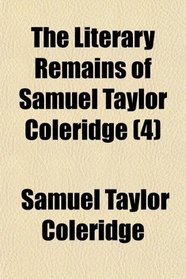Search -
The Literary Remains of Samuel Taylor Coleridge (4)
The Literary Remains of Samuel Taylor Coleridge - 4
Author:
Volume: 4 General Books publication date: 2009 Original publication date: 1839 Original Publisher: W. Pickering Subjects: Literature Drama / Shakespeare Literary Criticism / Shakespeare Notes: This is a black and white OCR reprint of the original. It has no illustrations and there may be typos or missing text. When you buy the Genera... more »
Author:
Volume: 4 General Books publication date: 2009 Original publication date: 1839 Original Publisher: W. Pickering Subjects: Literature Drama / Shakespeare Literary Criticism / Shakespeare Notes: This is a black and white OCR reprint of the original. It has no illustrations and there may be typos or missing text. When you buy the Genera... more »
ISBN-13: 9781150499005
ISBN-10: 1150499001
Publication Date: 12/20/2009
Pages: 208
Rating: ?
ISBN-10: 1150499001
Publication Date: 12/20/2009
Pages: 208
Rating: ?
0 stars, based on 0 rating




